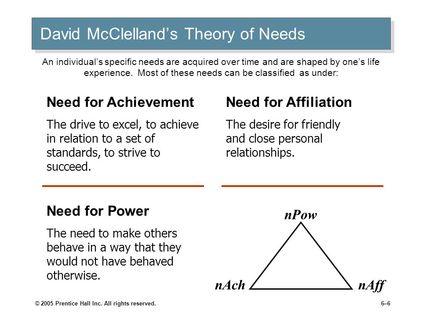Theory of Needs
The Summation of David C. McClelland’s Theory of Needs
David C. McClellandOpens in new window of Harvard UniversityOpens in new window was a U.S. psychologist who performed research on motivation patterns and spent much of his career studying motivation and how it affects leadership behavior.
He propounded his human motivation theory, the theory of needs, which is also known as the three needs theory, primarily because the theory revolves around three important aspects:
- Achivement
- Affliliation
- Power
According to the McClelland’s Theory of Needs, all of us are motivated by three basic needs, one which will be dominant, and individuals’ specific needs are acquired and shaped over time through the experiences they have had in life (see Figure X-1).
 Figure X-1 McClelland’s Theory of Needs | Powered by weeblyOpens in new window
Figure X-1 McClelland’s Theory of Needs | Powered by weeblyOpens in new window
|
- Need for Achievement
The need for achievement is the urge to achieve something in what you do. If you are a lawyer, it is the need to win cases and be recognized; if you are a painter, it is the need to paint a famous painting.
It is the need that drives a person to work and even struggle for the objective that he or she wants to achieve.
People who possess high achievement needs are people who always work to excel by particularly avoiding low-reward, low-risk situations and difficult-to-achieve high-risk situations. Such people avoid low-risk situations because of the lack of a real challenge and their understanding that such achievement is not genuine.
They also avoid high-risk situations because they perceive and understand it to be more about luck and chance and not about one’s own effort. The more achievements they make, the higher their performance because of higher levels of motivation.
These people find innovative ways to achieve goals and consider their achievement a better reward than financial ones. They make calculated decisions, always appreciate feedback, and usually work alone. Individuals motivated by needs for achievement usually have a strong desire of setting up difficult objectives and accomplishing them.
Their preference is to work in a result-oriented environment and always appreciate any feedback on their work. Achievement-based individuals take calculated risks to reach their goals and may circumvent both high-risk and low-risk situations. This personality type believes in a hierarchical structure derived primarily by work-based achievements.
- Need for Power
The need for power is the desire within a person to hold control and authority over another person and influence and change their decisions in accordance with his or her needs or desires.
The need to enhance their self-esteem and reputation drives these people, and they desire their views and ideas to be accepted and implemented over the views and ideas over others.
These people are strong leaders and can be best suited to leading positions. They either belong to personal or institutional power motivator groups. If they are a personal power motivator, they would have the need to control others, and an institutional power motivator seeks to lead and coordinate a team toward an end.
The individuals motivated by the need for power have a desire to control and influence others. Competition motivates them, and they enjoy winning arguments. Status and recognition are something they aspire for and they do not like being on the losing side.
They are self-disciplined and expect the same from their peers and teams. They do not mind playing a zero-sum game, where, for one person to win, another must lose; collaboration is not an option. This motivational type is accompanied by needs for personal prestige and better personal status.
- Need for Affiliation
The need for affiliation is the urge of a person to have interpersonal and social relationships with others or a particular set of people.
Individuals with the need for affiliation seek to work in groups by creating friendly and lasting relationships and have the urge to be liked by others. They tend to like collaborating with others rather than competing with them and usually avoid high-risk situations and uncertainty.
The individuals motivated by the need for affiliation prefer being part of a group. They like spending their time socializing and maintaining relationships and possess a strong desire to be loved and accepted. These individuals stick to basics and play by the rules, without feeling a need to change things, primarily due to fear of being rejected.
People in this group tend to adhere to the cultural norms of the workplace and typically do not change them for fear of rejection. Collaboration is the way to work and competition remains secondary. They are not risk seekers and are more cautious in their approach. These individuals work effectively in roles based on social interactions—for example, client service and other customer interaction positions (see Figure X-2 presented in tabular form below).
| Achievement | Affiliation | Power | ||
|---|---|---|---|---|
| Personalized Power | Socialized Power | |||
| When this motive is aroused in them, leaders experience a need to: | ||||
|
|
|
| |
| As a result, they wish to: | ||||
|
|
|
| |
| these aspirations lead them to: | ||||
|
|
|
| |
| Figure X2 What’s Your Motivation? | ||||
- Research data for this work have been adapted from the manual:
- Fundamentals of Management ... By Danny Samson, Richard L Daft, Timothy Donnet.

